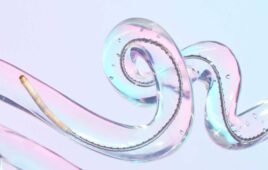Depression can be a devastating and unremitting problem.
Researchers of a new study published in the current issue of Biological Psychiatry report successful reduction of depressive symptoms in patients using a novel non-invasive method of vagus nerve stimulation, or VNS.
Despite the growing number of medications and neurostimulation approaches available, residual symptoms may be both distressing and disabling. Traditional vagus nerve stimulation (VNS) is a neurostimulation technique that has been used to alleviate treatment-resistant symptoms of depression. Clinical trials suggested that it produced modest benefit that emerged over long periods of time. However, it was also costly and required risky neurosurgery to implant the vagal nerve stimulators.
In this new study, Drs. Peijing Rong and Jiliang Fang at the China Academy of Chinese Medical Sciences, collaborating with Jian Kong’s research team at Harvard Medical School, investigated a new, modified form of VNS called transcutaneous VNS, which instead stimulates the vagus nerve through electrodes clipped onto the ear, similar to how headphones rest inside the ear.
Patients with major depressive disorder who volunteered for the study received either transcutaneous VNS or sham (placebo) VNS and underwent a functional neuroimaging scan both before and after one month of treatment.
Compared to patients who received sham VNS, the patients who received real VNS showed significant improvement of their depressive symptoms. This improvement was associated with increased functional connectivity between the default mode network and precuneus and orbital prefrontal cortex, an important network in the brain known to be altered in depression.
“The transcutaneous approach may make this treatment for depression more accessible to people with depression, providing it proves to retain the efficacy of the more direct form of vagal nerve stimulation,” said Dr. John Krystal, Editor of Biological Psychiatry.
Rong added, “This non-invasive, safe and low cost method of depression treatment can significantly reduce the severity of depression in patients and shows promise for future use.”




